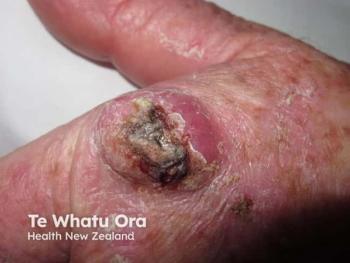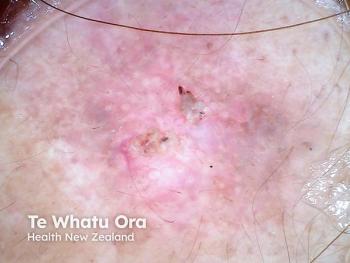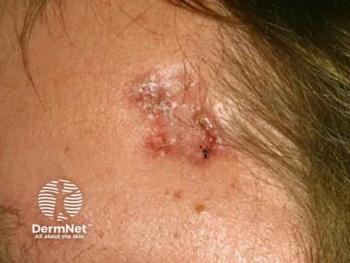
Lenvatinib/Pembrolizumab Demonstrates Continuing Efficacy in Advanced Melanoma
Lenvatinib and pembrolizumab continued to yield meaningful and durable responses in patients with advanced melanoma who had progressed on previous PD-L1 inhibitor treatment.
Lenvatinib (Lenvima) and pembrolizumab (Keytruda) continued to yield meaningful and durable responses in patients with advanced melanoma who had progressed on previous PD-L1 inhibitor treatment, according to updated findings of the LEAP-004 (NCT03776136) trial presented virtually during the 2021 ASCO Annual Meeting.1
At a median study follow up of 15.3 months (range, 12.1-19.0) 17.5% of patients (n= 103) were still receiving lenvatinib and the objective response rate (ORR) remained the same from previous follow ups at 21.4% (95% CI, 13.9-30.5) as the number of complete responses among patients increased by 1. The disease control rate (DCR) saw a slight increase from 65% to 66% (95% CI, 56-75.1) after 1 additional patient was categorized with stable disease. The best overall response was observed among patients with stable disease (44.7%), followed by patients with progressive disease (29.1%; PD), partial response (18.4%), and complete response (2.9%).
“Median duration of response, compared with the previous analysis, increased from 6.3 months to 8.3 months,” said Ana Arance, MD, PhD, of the Hospital Clinic Barcelona, in Barcelona, Spain, and lead investigator of the trial, in a presentation of the updated open-label, single-arm, phase 2 study data at the 2021 virtual ASCO meeting.2 “With that, 38.6% of the responses are ongoing at 9 months.”
Eligible patients for the trial had to have PD confirmed within 12 weeks of their last dose of a PD-L1 inhibitor given alone or with an anti–CTLA-4 or other therapies for 2 or more doses. These patients were then given 20 mg of lenvatinib once daily along with 35, or more, doses of pembrolizumab at 200 mg every 3 weeks until PD, unacceptable toxicity, or patient/physician decision. The primary end point of the study is ORR, with secondary end points of progression-free survival (PFS), duration of response (DOR), overall survival (OS), and safety.
In the total patient population PFS was 4.2 months (95% CI, 3.8-7.1) and overall survival was 14 months (95% CI, 10.8-not releasable). PFS at 12 months was estimated at 18.5% and OS was estimated at 54.5%. Any changes from baseline were also observed in 26 patients (25.2%) and any decrease of target lesions was seen in 67 patients (65.0%) with lactate dehydrogenase greater or less than upper limit normal.
“Eleven patients qualified as primary resistance in the adjuvant setting. Sixty-two patients were classified as primary resistance in the metastatic setting, and 22 patients were included in the group of secondary resistance in the metastatic setting,” said Arance. ORR in the primary resistance adjuvant setting was 18.2% with DCR at 63.6% and PD at 27.3%. Primary resistance in the metastatic setting had a DCR of 61.3% and in the secondary setting was at 68.2%. “In the metastatic setting response rate was similar in primary or secondary resistance with 22.6% and 22.7%,” she added.
Treatment-related adverse events (TRAEs) were comparable to previous analysis and the general safety profile of the combination of lenvatinib and pembrolizumab. Incidence of TRAEs was 96.1% at any grade with the most common at grade 3-5 at 45.6% with 40.8% at grade 3 TRAEs. Serious TRAEs were found in 18.4% of patients and 7.8% led to discontinuation of treatment, 59.2% led to interruption of treatment, and 56.3% had TRAEs that led to lenvatinib dose reduction. Only 1% of patients had a grade 5 TRAEs due to low platelet count.
“With additional follow up, lenvatinib plus pembrolizumab continues to show clinically meaningful, durable responses in patients with advanced melanoma with confirmed progression on a PD-1 or PD-L1 inhibitor given alone, or in combination, with a confirmed ORR,” Arance concluded.
This article was originally published by our sister publication
References:
- Arance A, Cruz-Merino L, Petrella T, et al. Lenvatinib plus pembrolizumab for patients with advanced melanoma and confirmed progression on a PD-1 or PD-L1 inhibitor: Updated findings of LEAP-004. J Clin Oncol. 2021;39(suppl 15; abstr 9504). doi: 10.1200/JCO.2021.39.15_suppl.9504
- Arance A, Cruz-Merino L, Petrella T, et al. Lenvatinib plus pembrolizumab for patients with advanced melanoma and confirmed progression on a PD-1 or PD-L1 inhibitor: Updated findings of LEAP-004. Presented at: 2021 ASCO Annual Meeting; June 4-8, 2021; Virtual. Abstract 9500.
Newsletter
Like what you’re reading? Subscribe to Dermatology Times for weekly updates on therapies, innovations, and real-world practice tips.











